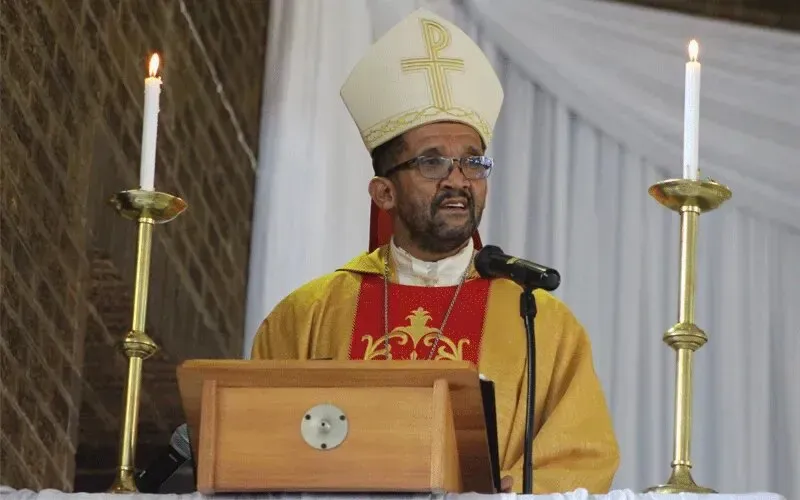“Even as they (women) regard themselves as feminists, they continue to facilitate their own abuse by keeping quiet and hoping that their men will change,” Bishop Sipuka says.
Unfortunately, he says, the Church is also not innocent of gender inequality and violence.
“Our courts list for prosecution cases includes Pastors who have raped young women of their Congregation. Our own Church has come a long way and still has a long way to go on this matter of gender equality,” Bishop Sipuka says.
He explains that although natural inferiority of women was never the official teaching of the Church, practices of excluding women from some lay ministries like reading in the Church, serving on the altar, and having their feet washed on Holy Thursday liturgy confirmed this view about women.
It is Pope John Paul II’s Encyclical Letter, Mulieris Dignitatem, “On the Dignity and Vocation of Women” that later raised the status of women in the Catholic Church, the 61-year-old Bishop notes.
(Story continues below)
“All lay ministries previously reserved for men are now open to both genders including leading priest-less services, distribution of communion, funeral services, leadership in Parish Pastoral Councils, appointment to offices of the Pope (Dicasteries) in Rome and papal commissions,” the Local Ordinary of Umtata says.
He provides the example of Sr. Hermenegild Makoro, the former SACBC Secretary who is now serving in two Papal commissions, one on prevention of sexual abuse of minors and another, on the 2023 Synod of Bishops.
Issues of sexual abuse in Church, however, persist despite the major strides made to end them, the Bishop says, and explains that the problem is evident in cases of sexual abuse of minor girls and women Religious by Priests.
The abuses, he says, are informed by “patriarchal attitudes” and “entrenched by clericalism.” This is a mindset which, the Bishop, has seen members of the Clergy say, “because I am a Priest, I can engage in a crime of abuse and get away with it”.
The Bishop who also serves as SACBC President says that little has come out of the efforts that have been in place to end gender inequality in South Africa.
“Guest speakers have penned and eloquently delivered speeches on gender-based violence with thunderous applause in response. Masters and Doctoral theses on gender equality and gender-based violence occupy a substantial space in university libraries. Their value, however, lies more in the one-day joyous ceremony of graduation and when they are referenced for another new thesis or book on gender equality than on implementing the recommendations they make,” he says.
“We have had summits on Gender-based violence, revolutionary political speeches on violence against women are constantly being made, tough laws are promised by those in authority, and we are not short of television debates on this subject, particularly during this month of August,” the Bishop says, adding that all these efforts are not helping.
In South Africa, gender-based violence is described as the 2nd pandemic, the Bishop says, but expresses regret that efforts to end the COVID-19 pandemic are not being channeled towards bringing gender-based violence to an end.
“While we describe gender-based violence as a pandemic, there is no convincing indication that we are practically and decisively dealing with it as we do with COVID-19,” he says, and adds, “It is time that we narrow these insightful speeches and well researched theses down to understandable information and doable practices at home, at school and in Church to reduce gender inequality and the concomitant violence with the aim of ultimately ending them.”
“We should advocate for policies in government and business that promote equity between women and men and between a girl-child and a boy-child,” the Bishop says.
Hinting on possible collaboration between the government and the Church in ending gender-based violence, the Local Ordinary of Umtata poses, “Could not the government partner more with Churches and provide them with resources and space to engage with this problem instead of wanting to do it all alone and fail?”
He notes that drunkenness in South Africa is a major contributing factor to women's violation, and poses, “Could not shebeens (liquor canteens), as a condition for keeping their licenses be expected to conduct regular mandatory workshops on gender equality and gender-based violence?”
“If we care enough about this problem, platitudes and slogans must give way to actions that will make a difference,” the Bishop of Umtata says in his August 31 reflection shared with ACI Africa.
Agnes Aineah is a Kenyan journalist with a background in digital and newspaper reporting. She holds a Master of Arts in Digital Journalism from the Aga Khan University, Graduate School of Media and Communications and a Bachelor's Degree in Linguistics, Media and Communications from Kenya's Moi University. Agnes currently serves as a journalist for ACI Africa.








